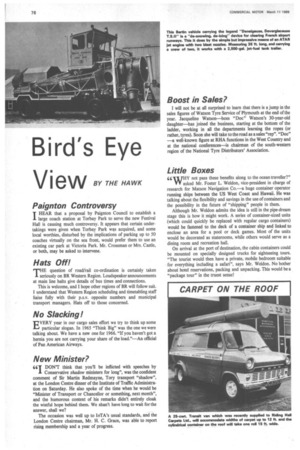Bird's Eye
Page 78

Page 79

If you've noticed an error in this article please click here to report it so we can fix it.
View BY THE HAWK
Paignton Controversy
T HEAR that a proposal by Paignton Council to establish a large coach station at Torbay Park to serve the new Festival Hall is causing much controversy. It appears that certain undertakings were given when Torbay Park was acquired, and some local worthies, disturbed by the implications of parking up to 50 coaches virtually on the sea front, would prefer them to use an existing car park at Victoria Park. Mr. Crossman or Mrs. Castle, or both, may be asked to intervene.
Hats Off!
THE question of road/rail co-ordination is certainly taken seriously on BR Western Region. Loudspeaker announcements at main line halts give details of bus times and connections.
This is welcome, and I hope other regions of BR will follow suit. I understand that Western Region scheduling and timetabling staff liaise fully with their p.s.v. opposite numbers and municipal transport managers. Hats off to those concerned.
No Slacking!
EVERY year in our cargo sales effort we try to think up some particular slogan. In 1965 "Think Big" was the one we were talking about_ We have a new one for 1966. "If you haven't got a hernia you are not carrying your share of the load."—An official of Pan American Airways.
New Minister?
641. DON'T think that you'll be inflicted with speeches by Conservative shadow ministers for long", was the confident comment of Sir Martin Redmayne, Tory transport "shadow", at the London Centre dinner of the Institute of Traffic Administration on Saturday. He also spoke of the time when he would be "Minister of Transport or Chancellor or something, next month", and the humorous context of his remarks didn't entirely cloak the wistful hope behind them. We shan't have long to wait for the answer, shall we?
The occasion was well up to IoTA's usual standards, and the London Centre chairman, Mr. H. C. Grace, was able to report rising membership and a year of progress.
Boost in Sales?
I will not be at all surprised to learn that there is a jump in the sales figures of Watson Tyre Set-vice of Plymouth at the end of the year. Jacqueline Watson—boss "Doc" Watson's 30-year-old daughter—has joined the business, starting at the bottom of the ladder, working in all the departments learning the ropes (or rather, tyres). Soon she will take to the road as a sales "rep". "Doc" —a well-known figure at RHA functions in the West Country and at the national conferences—is chairman of the south-western region of the National Tyre Distributors' Association.
Little Boxes
6 Y not pass these benefits along to the ocean traveller?" Wiasked Mr. Foster L. Weldon, vice-president in charge of research for Matson Navigation Co.—a huge container operator running ships between the US West Coast and Hawaii. He was talking about the flexibility and savings in the use of containers and the possibility in the future of "shipping" people in them.
Although Mr. Weldon admits the idea is still in the pipe-dream stage this is how it might work. A series of container-sized units (which could quickly be replaced with regular cargo containers) would be fastened to the deck of a container ship and linked to enclose an area for a pool or deck games. Most of the units would be decorated as staterooms, while others would serve as a dining room and recreation hall.
On arrival at the port of destination, the cabin containers could be mounted on specially designed trucks for sightseeing tours. "The tourist would then have a private, mobile bedroom suitable for everything including a safari", says Mr. Weldon. No bother about hotel reservations, packing and unpacking. This would be a "package tour" in the truest sense! Why praise LTB?
AS a regular reader of COMMERCIAL MOTOR I was interested in your reports of the Amsterdam Show and in particular of the new DAF SB200 p.s.v. destined for the major Dutch cities.
With evidence of great progress from the Continent and my experiences of bus travel in Stockholm, I am amazed that London Transport merits credit in your magazine. In the past five years LTB has hardly appeased the travelling public, except to put a few staid Atlanteans into service (not that I think this progress) after everyone else had done so, and to doctor up the Green Line somewhat. When rear engines have been in vogue for a considerable time now, it is regrettable that a rear-engined Routerneaster, ostensibly due in the spring, should be so tardy. But even worse, the acceptance appears dependent on its fuel consumption—how niggly can one become?
The Dutch stick 167 b.h.p. and a Diwabus transmission in the DAF chassis and accept the pros rather than the cons, yet we propel 13 tons of bus with about 125 b.h.p. (derated, of course) and fit the still untamed automated epicyclic gearbox.
If the new rear-engined Routemaster were to offer a pleasing external shape and new colour scheme, 160 b.h.p. turbocharged horizontal diesel and torque converter transmission, air suspension as standard, separate entrances and exit (exit doors photoelectrically operated), wider gangways and special provision for standing, staggered seating, effective soundproofing, fluorescent lighting and imaginative interior design, full fresh-air ventilation with large, non-opening windows, public address system, convenient luggage bays, and of course full provision for single manning, perhaps the motorist would feel he had a lusty and worthwhile competitor and would be wooed sufficiently to escape the growing undemocratic threats to his present-day right.
Just in case it is thought that I am being unrealistic, the "new" Routemaster is just a copy of the double-deckers Stockholm city first saw fit to introduce a year or so ago. Of course, the Swedes have another advantage—they believe that women can single-man double-deckers—and how right they arel It is a bad feature of British life that we are prone to be satisfied with mediocrity, and London Transport's performance in the face of the intense competition from the car is rather disappointing. With an unchallenged mandate to provide transport in London, the field was wide open to pioneer and exploit every facet of bus operation, subject to financial restraint. Progress has been conservative, and the unwillingness to use the results of other countries or to lead in any aspect sent the suffering public scurrying for cars, Japanese motorcycles and mopeds.
R. WALL, London SE9.
Braking on 30-ton Artics
THE PRESENT system of braking on 30-ton artics with separate actuation of the outer axles is causing some concern to myself as an engineer, and also to the drivers employed by the company.
I should very much like to know the views of other transport engineers on this subject. My own is that the braking of the outer axles is dangerous in certain conditions and I fail to see, if the systems have been tested under everyday conditions, how in fact they have been accepted.
The situation is further aggravated by the fact that the feed to the semi-trailer in these types of secondary-brake systems travels all the way from the tractor. On an outfit you tested recently the delay was "well over 2 sec.". This means that only the front brakes, which will be applied immediately, are working for this time.
If the outfit is empty and the wheels lock then you go straight on, even though you do not want to. And if they do not lock and there is enough braking effort to make a difference—this is not always so then there is a good chance of the back coming round into a jack-knife.
There has been much confusion among every manufacturer over these new regulations and I think there still is. Whilst I have great respect for the work by MIRA and similar bodies, I feel that the everyday hazards a driver has to combat cannot be reproduced on a test run. I have made journeys on these vehicles many times and I still feel that to control only the semi-trailer wheels and keep the braking off the front wheels is the right thing to do to avoid jack-knifing.
Another point of criticism is that semi-trailer manufacturers still continue to churn out their trailers with plumbing liable to result in excessive delay, although they must be fully aware of the problems that this is causing.
D. J. BROOM, Samuel Williams and Sons Ltd., Dagenham Dock, Essex.








































































































































